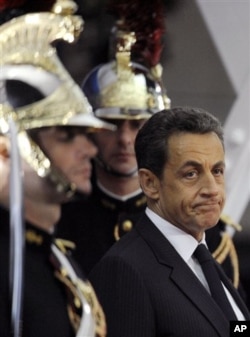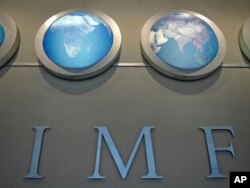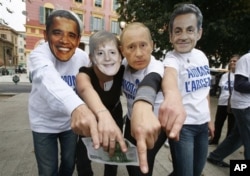The eurozone’s sovereign debt crisis overshadowed much of the G20 summit in Cannes, although some issues of interest to the developing world were mentioned in the final communiqué.
Support for agriculture
The G20 leaders did show their support for various initiatives to help agriculture, including the Advanced Market Information System (AMIS), said John Kirton, the co-director of the G20 Information Centre at the University of Toronto’s Munk School of Global Affairs. AMIS is a database designed to help with data collection and analysis of agricultural markets, including stock levels and harvest forecasts.
Kirton said the summit showed support for building up local buffer stocks, or “extra food -- part of a rapid response system that could be kept on hand in regions where famine could break out, so when it does, we do not have to wait to have it shipped halfway around the world, find the boats and planes [to transport relief], and governments to finance the purchase of the food.”
The communiqué said leaders also decided that “food purchased for non-commercial humanitarian purposes by the World Food Program will not be subject to export restrictions or extraordinary taxes.”
Incentive for Innovation
The communiqué also expressed increased support for agricultural research, although one idea with popular support was not mentioned in the final document: incentives for agricultural innovation, like advanced commitments by sponsors to underwrite the development of new technologies.
That approach has been applied to the development of vaccines, said Lawrence MacDonald of the Center for Global Development in Washington, DC.
MacDonald, the center’s vice president for communications and policy outreach, said it could be applied to the development of new types of popular crops in Africa like maize, cassava and other roots crops for which there’s not sufficient market demand to fund improvements.
Referring to a program pioneered by his organization for the health care sector, he said,” there’s now a 1.5 billion dollar advance market commitment that has accelerated development of a pneumonia vaccine suitable for use in developing countries. The vaccine has proven effective In preventing diseases that annually kill about three million children in developing countries. We believe a similar approach could work in agriculture,” he said.
IMF support
Some observers had expected the G20 to announce it would increase resources to more than one trillion dollars.
Instead, said analyst John Kirton, leaders were consumed by debates over how support for the IMF – much of which would go toward support for the eurozone – would be structured.
Kirton says the summit debated whether wealthier governments like Saudi Arabia, Singapore and China should contribute directly to bailout funds for the eurozone through the creation by the IMF of a “special purpose vehicle.” He said participants were not able to reach a consensus on the issue, and many potential contributors complained that the debate left too many questions unanswered.
“Once the concept is put on the table,” Kirton said, “the question arises: ‘Am I likely to get my money back?’ ‘What’s the collateral?’ ‘What are the guarantees? ‘ ‘Who is guaranteeing it?’ ‘What are the interest rates I’m going to get?’ There was always a lack of detail in what the European rescue plan was. It was difficult for anyone to pick a concept, like a special purpose vehicle [and answer those questions] before moving it ahead. We didn’t get the kind of detail needed from our friends in Europe to take that discussion very far.”
Special Drawing Rights
The summit also did not determine whether the world’s leading economies should press to make more money available through currency issued by the IMF called special drawing rights (SDRs). They are made up of euro, yen, sterling and dollar. SDRs are allocated to each IMF member according to the size of its contribution to the Washington-based institutions. SDRs can be lent by one member state to another, and provide more financial stability..
“At the G20 summit in London in April 2009,” Kirton said, “the G20 decided to increase the amount of SDRs available by 250 billion dollars, a massive increase. So the question being considered here was whether or not the time had come now to do that again – to create another 250 billion on hand.”
G20 finance ministers are expected to resume the debate at their next meeting in February.
Financial Transaction Tax
French president Nicolas Sarkozy, this year’s leader of G20, had advocated a tax on financial transactions that could be used to bolster aid budgets and help the developing countries adapt to climate change. But the tax, whose backers included France, Germany, Ethiopia and South Africa, lacked unanimous support. Opposing it were the United States, Great Britain, Japan and Australia.
Lawrence MacDonald of the Center for Global Development said that failure to reach agreement on the tax was not surprising, given the opposition, but was nonetheless “one of the disappointments of the G20 summit.”
“I think we may have seen a high point in the movement to have this tax,” he said, “and it ultimately failed. It is most effective when it’s done in all the major financial markets of the world. Otherwise, it’s easy to move your transaction from a place imposing the tax to one that does not.”
He said he’d be surprised if it would be revived by next year’s head of the G20, Mexico.
Overall, MacDonald said he supports the G20’s show of support for the IMF. Some have questioned whether the institution, which has been a proponent of austerity measures, or “structural adjustment,” in the developing world, is the proper vehicle for handling the global financial crisis.
“The IMF has had a long history of designing and implementing austerity packages for developing countries when they got into trouble, had too much debt and borrowed too much,” he said. “And I think it’s appropriate that the IMF should now be called upon to administer this same somewhat bitter but effective medicine in Europe.”
“It also provides a sort of third party disciplinary action in a way that, say, Germany, perhaps, cannot do as easily in dealing with Greece.”
Compliance
The G20 summit failed to address some of the issues of importance to development experts, including the causes of the price volatility, such as speculation and policies that promote growing food crops like maize for use as fuels.
But a recent study the G20 Research Group in Toronto found that for the most part the leaders of industrialized countries have kept the development promises made at last year’s summit in Seoul.
“Seventy percent [of the 20] had a solid B performance,” said Kirton. “Australia gets an A+. The ones who have complied the most are Australia, the EU, France. The U.S. came in middle of the pack; South Africa too is struggling a bit because what you see is not a lack of willingness to implement and comply, but lack of ability. Argentina [was the only one that failed].”
The one dark spot on the record, said Kirton, was in the area of preventing protectionist trade barriers. “The spirit is willing, but the flesh is weak,” he said of the disparity between members’ rhetorical support for free trade during the economic downturn and their actual performance.


















